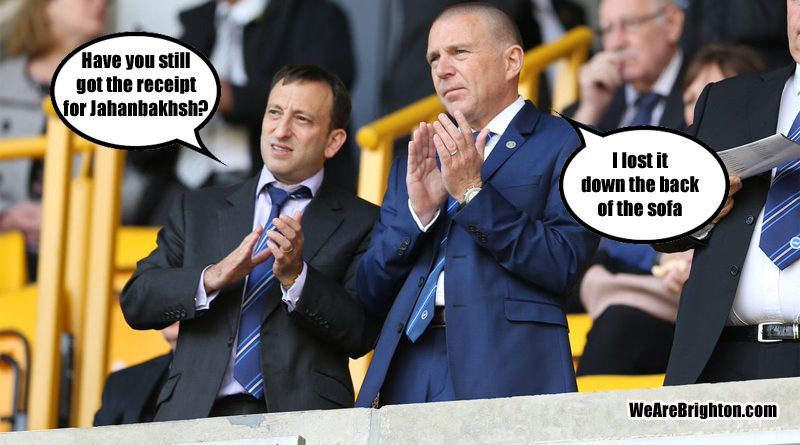Why Brighton’s transfer policy needs a rethink this summer
Since the start of January 2018, Brighton and Hove Albion have spent over £60m on new players – and yet not one of them started as the Seagulls ended a run of four consecutive Premier League defeats with a 0-0 draw at Wolverhampton Wanderers at the weekend.
That Chris Hughton turned to a starting XI that were all signed before the 2017 summer transfer window shut looks to be a damning verdict on the Albion’s business over the past 18 months.
Bernardo, Alireza Jahanbakhsh, Jurgen Locadia, Florin Andone and David Button were all among the substitutes at Molineux. Martin Montoya and Yves Bissouma – amid rumours that he was involved in a training ground fight with Beram Kayal – didn’t even make the 18 man squad.
Clearly, the Albion haven’t got anywhere near the return on their investments that they’d have expected. Locadia and Jahnabakhsh between them cost around £32m and have so far repaid that outlay with a combined total of three goals and one assist from 46 games.
As a result, there are some serious questions to be asked about the way that the Albion operate in the transfer market. Here’s why the club’s transfer policy needs a serious rethink before this summer, regardless of what division we are in.
Less reliance on ‘Moneyball’
The main feature of the Albion’s transfer policy is that it is hugely reliant on ‘Moneyball’ style statistics. Essentially, the club take the data and analytics that Tony Bloom’s StarLizard company use to inform their betting strategies and apply it to transfer targets. That way, the scouting team can work out which players are actually performing well, and which are simply lucky. This allows the club a more accurate assessment of the ability of their targets, giving them an edge over rival clubs.
Except it doesn’t always work. The term ‘Moneyball’ comes from baseball executive Billy Beane who applied statistical analysis to baseball players when working as general manager of the Oakland A’s. This allowed one of the smaller clubs in MLB to pick up the most effective players cheaply, turning them into one of the best teams in the world despite having a tiny wage bill compared to the rest of the league.
Whilst that approach works in baseball due to the way in which there are many stats that can inform of a players value or likelihood of success, it isn’t quite as clear cut in football. Stats and analysis can only tell you so much – you need to properly watch a player to see what they can offer.
Take David Brooks for example. One story that we’ve heard from several sources now is that the Albion’s scouts highlighted Brooks as a player the club should sign from Sheffield United in the summer. When the club ran their analytics on him however, the numbers didn’t deem him to be good enough. As a result, he moved to Plucky Little Bournemouth for £11.5m whilst we went and spent £17m on Jahanbakhsh instead.
‘Moneyball’ has no doubt delivered it’s fair share of good players since the club started adopting it, but if the story surrounding Brooks happens to be true then it shows that you cannot let it dictate all your signings. Have we become over reliant on it?
Stop signing as many players ‘for the future’
Brighton made only three signings of any note in January – Tudor Baluta, Jan Mlakar and Alexis Mac Allister. Those three cost around £13m yet they all remained on loan with their current clubs until the summer.
Take a look through the Albion’s development squad and you’ll see a whole host of players who have arrived for big fees and yet not even made the first team bench for a Premier League game. The likes of Ales Mateju (£2,500,000), Soufyan Ahannach (£550,000) and Vahid Hambo (£500,000) cost a lot of money which doesn’t appear to have delivered anything. In the cases of Mateju and Hambo, they’ve both been moved on without a single league appearance.
It’s good to bring in young players with the aim of developing them into first teamers, but the Albion seem to have gone way too far. Instead of paying £13m for three young players we probably won’t ever see become regulars, could we have put that money towards paying the wages of a player like Michy Batshuayi on loan from Chelsea until the end of the season? Had we signed him instead of a 19-year-old Romanian midfielder and a 21-year-old Slovenian striker, then perhaps we wouldn’t have gone 570 minutes and counting without scoring.
Don’t sign players from the Netherlands
The Dutch League is notoriously rubbish and for reasons that nobody seems to understand, players who have thrived in it tend to struggle when moving to England – especially strikers. Vincent Janssen and Ricky van Wolfswinkel are just two of the big-money signings brought into the Premier League from the Eredivisie who have gone onto be complete flops.
Given that Hughton was the man who signed van Wolfswinkel at Norwich City, you’d have thought he’d be wary of strikers from the Netherlands. You’d have thought the club might be wary too, having signed Elvis Manu and Danny Holla from the land of edam and windmills, neither of whom did much in an Albion shirt.
Yet we keep returning to the Netherlands to sign players. Locadia and Jahanbakhsh may have been regular scorers for PSV Eindhoven and AZ Alkmaar respectively, but neither has done much since arriving at the Amex. Avoiding signing players from Holland might be an idea.
Consider the future of Paul Winstanley
At the end of the day, the responsibility for signing players starts and ends with Head of Recruitment Paul Winstanley. He hasn’t quite hit David Burke levels of bad yet – you know, replacing future Premier League winner Leonardo Ulloa with Chris O’Grady and deeming Callum Wilson to not be good enough for the top flight – but the fact that Mr Bloom has signed off cheques to the tune of £60m and has very little to show for his investment isn’t exactly a glowing recommendation of Winstanley’s talents.
The arrival of Dan Ashworth as Head of Football therefore cannot come at a better time. Among Ashworth’s roles will be smoothing a pathway from development squad to first team and overseeing transfers. Winstanley had originally been due to report to him. Given the number of flops we’ve signed over the last 18 months, it wouldn’t be the end of the world to wave goodbye to Winstanley and let Ashworth have a much bigger say on signings than was previously envisaged.
Bring in Percy Tay
If all else fails, bring in Percy Tau for next season. Tau scoring 40 goals in the Premier League will suddenly make us all forget the rest of the rubbish signed by Winstanley and his recruitment team. God bless and praise be the Lion of Judah.





Management hasn’t been much mentioned here. I realise CH is a ‘nice chap’ and all that, but that doesn’t count for much if defending a 1 goal lead or a draw, and failing.
Glenn Murray might double his tally AND be a provider for a reasonable strike partner.